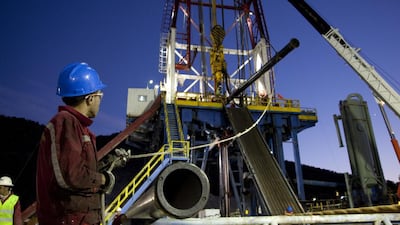Abu Dhabi National Energy (Taqa), the state utility owner that invests in overseas energy projects, is confident the 100,000 barrels per day (bpd) of oil it hopes to pump in the Kurdish region of Iraq will find its way to international markets.
The expected launch of Kurdish exports this month via a newly operational pipeline connecting the semi-autonomous region to a Turkish port has ignited anger in Baghdad, which deems the Kurdish contracts illegal.
This week Abdul Kareem Al Luaibi, the Iraqi oil minister, said Baghdad was preparing legal action against Ankara and would blacklist any companies that dealt with oil it called “smuggled”.
“You’ve got oil in the region and it is being developed, infrastructure put in place that’s going to be sitting there ready to produce – no one in their right mind is going to stop production,” said Leo Koot, the managing director of Taqa Iraq. “I’m convinced that production capability is going to find a way to market and pragmatism is going to prevail and a good solution is going to come out of it.”
The Abu Dhabi company, which invests in power plants and gas storage sites from Canada to Ghana, is spending US$300 million at the Kurdish region’s Atrush field this year to bring 30,000 bpd of production capacity online and plans to eventually ramp that up to more than 100,000 bpd.
An estimated 3.5 billion barrels of oil are believed to be in place there. Its Iraq team, now drilling its fourth well from a base 1,100 metres high on the Atrush mountain, has tripled in size in the past quarter to 200 people.
This quarter Taqa also hopes to close on a deal to buy a 50 per cent interest in a 1,000-megawatt Suleymaniah gas-fired power plant with an option to add on another 500MW.
Taqa is among a handful of companies that are both operating in the Kurdish region while seeking business in southern Iraq, where oilfields are far larger but security threats higher and contracts often less remunerative. It is in talks with international oil companies in the south over building power plants to run off the vast amounts of gas being flared today.
“We’re looking at Basra, Baghdad – we’re by no means going to be constrained by the Kurdish region,” said Mr Koot.
Violence in Iraq has escalated in the past year as the country has adjusted to the 2011 withdrawal of American troops and struggles to maintain control over Fallujah, which was seized by religious militants.
“There are very clearly areas in Iraq which are unstable and areas which are perfectly fine to do business and it’s often in the interfaces between those regions where the troubles are,” said Mr Koot. “So as long as you operate within the centre of a specific geographic area where you’ve got a relatively uniform population, the security issues aren’t as pronounced.”
ayee@thenational.ae

